Key takeaways:
- Clear communication and building rapport are crucial for successful author collaborations, preventing misunderstandings and fostering a supportive environment.
- Collaborating offers diverse perspectives, expanded networks, shared workloads, increased motivation, and enhanced learning opportunities, benefiting both authors involved.
- Finding compatible partners with complementary skills and shared goals leads to effective collaboration and personal growth.
- Celebrating successes, even small milestones, boosts motivation and encourages a positive atmosphere, reinforcing the collaborative relationship.
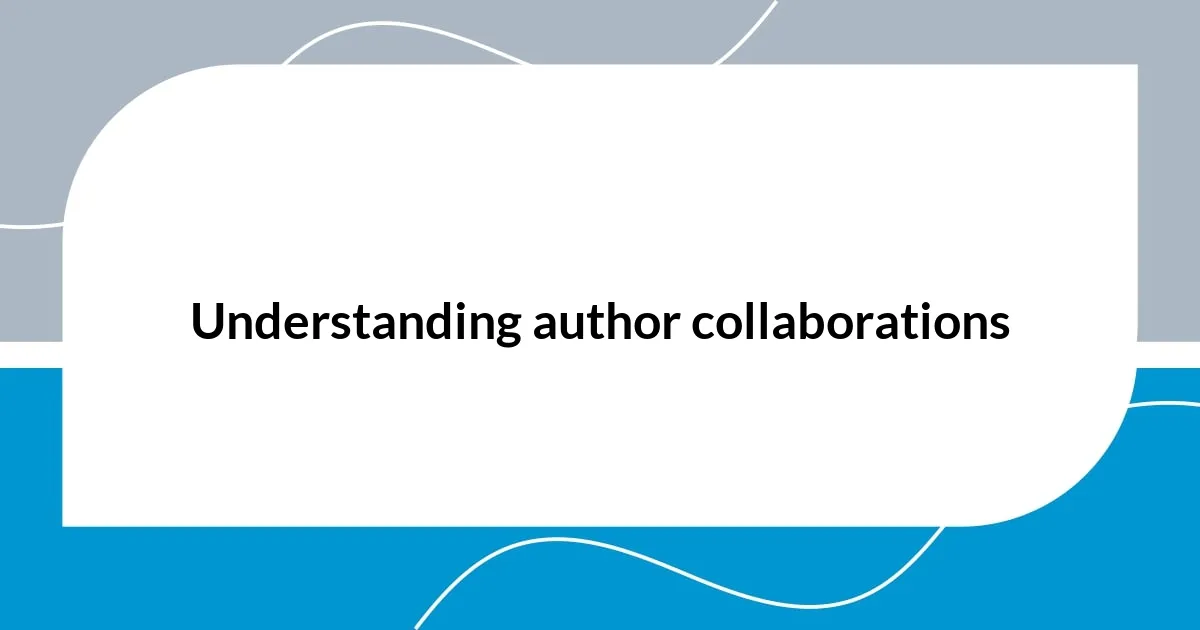
Understanding author collaborations
Author collaborations can be a powerful way to enhance creativity and expand your reach. I remember the first time I co-authored a project; I was nervous yet excited, wondering how our distinct voices would mesh. It’s amazing how two minds can create something that neither could have achieved alone, isn’t it?
When working with another author, clear communication becomes essential. Early on in one of my collaborations, I encountered misunderstandings that could have been avoided with open dialogue. It made me realize that building a rapport not only helps align our creative visions but also fosters a supportive environment where both parties feel valued.
Another aspect that often goes overlooked is the emotional journey that comes with collaboration. Sharing your work isn’t just about blending ideas; it’s about exposing parts of yourself. I found joy in the moments we celebrated wins together, but it also made me appreciate how vulnerabilities can shape a deeper connection. Have you ever felt that mix of excitement and anxiety when collaborating? It truly highlights the beauty and complexity of working alongside another creative soul.
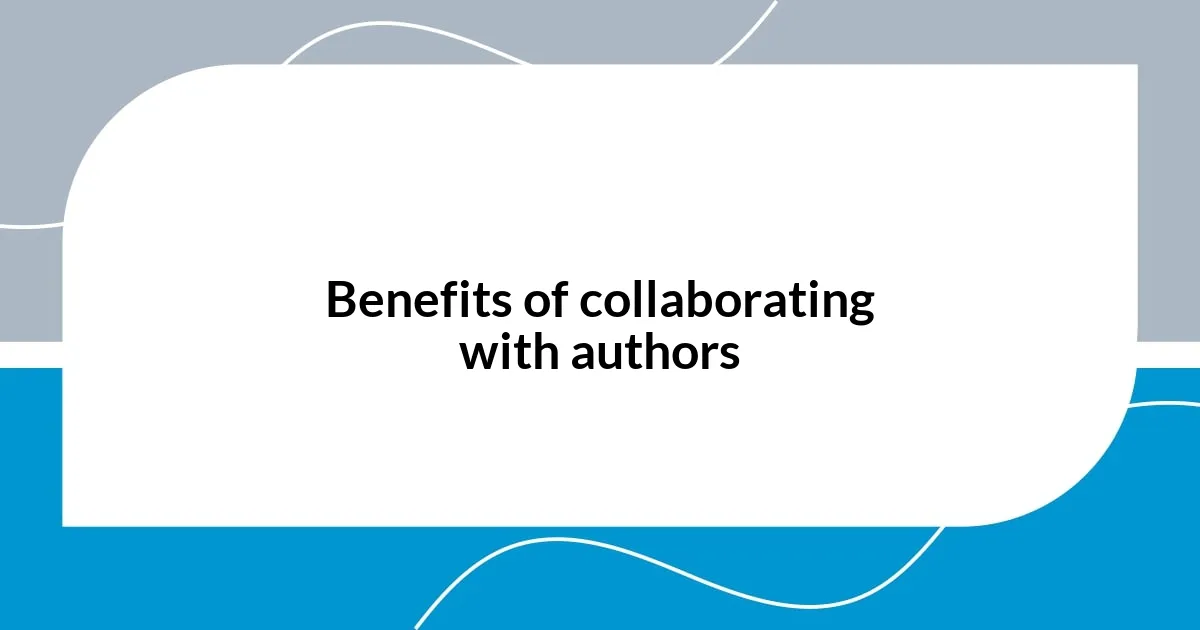
Benefits of collaborating with authors
Collaborating with authors brings a treasure trove of benefits that often go beyond simply producing content. I vividly recall a project where my co-author and I combined our expertise; our distinct perspectives not only enriched the narrative but also sparked a sense of camaraderie. The shared journey transformed our individual creative processes into a collective adventure, where each brainstorming session felt like uncovering hidden gems.
Here are some benefits of collaborating with authors:
- Diverse Perspectives: You gain fresh insights and ideas, making your work richer and more engaging.
- Expanded Network: Working with another author introduces you to their audience, broadening your reach and influence.
- Shared Workload: Splitting tasks means you can tackle bigger projects without feeling overwhelmed.
- Increased Motivation: Having a collaborator can keep you accountable and inspired to meet deadlines and goals.
- Enhanced Learning: Each author brings unique skills and knowledge, allowing you to learn from one another in the process.
In one collaboration, I discovered my co-author had a knack for marketing, which complemented my writing strengths. This synergy not only improved our project but also taught me valuable lessons about promotion and audience engagement. The growth I experienced from such interactions often spilled over into my solo work, propelling my overall development as an author. Wouldn’t you agree that it’s fascinating how collaborative efforts can elevate both the process and the end product?
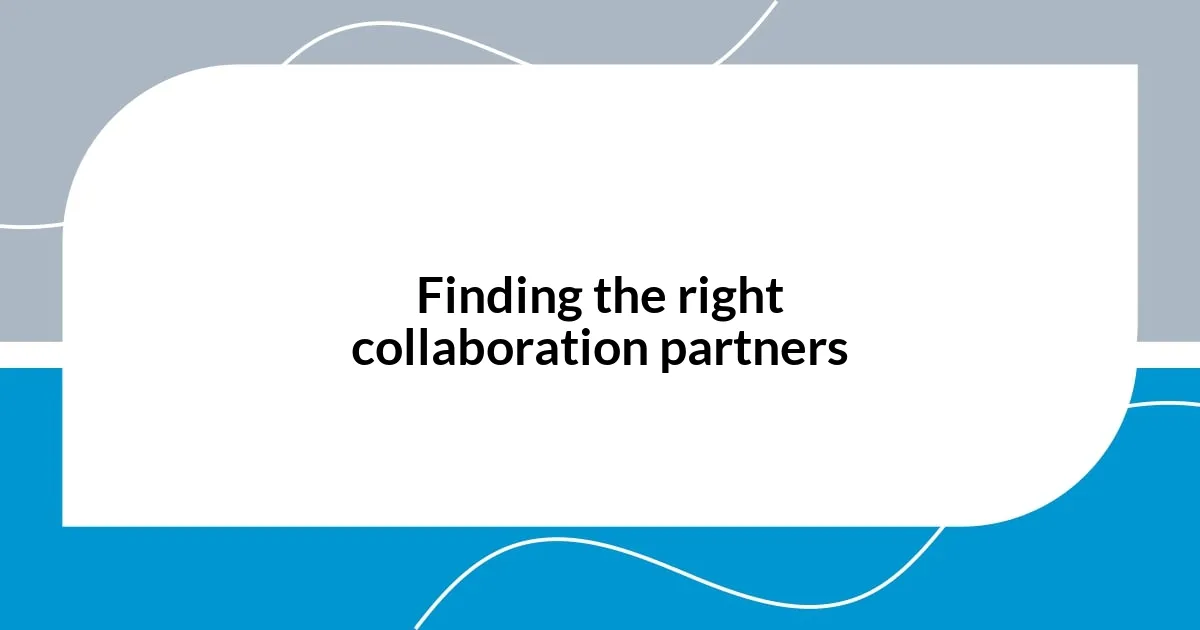
Finding the right collaboration partners
Finding the right collaboration partners is one of the most crucial steps in the author collaboration journey. I’ve learned that compatibility in both values and work ethic can make all the difference. For example, during a project I embarked on with an author who shared my commitment to thorough research, the entire process flowed seamlessly. We both cared deeply about authenticity, ensuring our final piece resonated with our audience. Have you ever experienced that magical synergy with someone who just gets you?
It’s worth considering the importance of complementary skills when selecting a partner. In one of my early collaborations, I teamed up with a co-author who excelled at creative storytelling while I focused on structure and style. This contrast in our abilities created a well-rounded narrative that neither of us could have achieved alone. Our diverse strengths not only enhanced the project but also made for a rewarding learning experience, as I picked up valuable techniques along the way. Isn’t it amazing how teamwork can nurture personal growth?
Finally, I find that shared goals and mutual respect form the backbone of a successful partnership. In another collaboration, we set clear expectations upfront and made a conscious effort to be open-minded. This honesty fostered an environment where both of us felt encouraged to express our thoughts without fear of judgment. The result? A project that truly reflected our combined vision. How does it feel when you connect with someone on that level? It’s invigorating, isn’t it?
| Criteria | Importance |
|---|---|
| Compatibility of Values | Essential for a smooth collaboration |
| Complementary Skills | Enhances creativity and effectiveness |
| Shared Goals | Drives focus and encourages open dialogue |
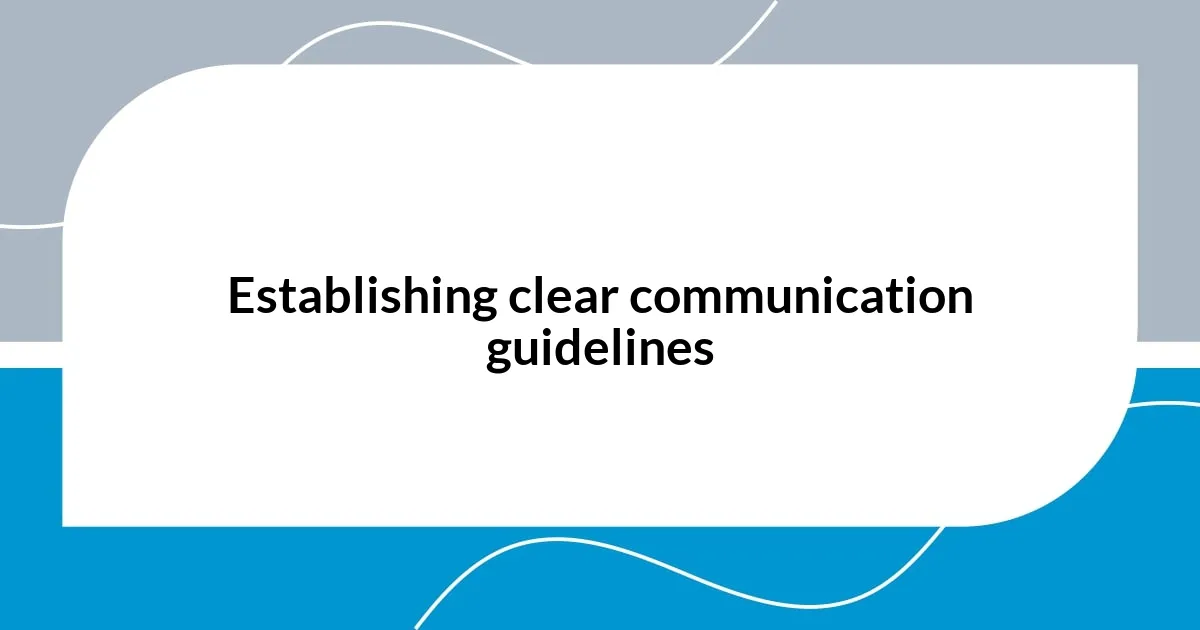
Establishing clear communication guidelines
Establishing clear communication guidelines is critical when diving into a collaborative project. I still remember a specific instance where my co-author and I took the time to define how we would communicate throughout our writing process. By setting regular check-ins, we could address any hurdles promptly, ensuring our ideas flowed freely without unnecessary confusion. It’s amazing how a simple agreement on communication can keep things moving smoothly.
One of the most effective strategies we implemented was using a shared document for updates and feedback. This tool became our lifeline; it allowed us to jot down thoughts whenever inspiration struck. Have you ever felt that spark of creativity and wished you had a way to capture it instantly? With this method, I realized that neither of us had to wait for scheduled meetings to share ideas or concerns, which heightened our collaboration’s dynamism.
I can’t stress enough how flexibility in communication channels can make a significant difference. For example, while we initially opted for emails, I suggested trying voice messages to convey tone and emotion more effectively. What a game-changer that was! Suddenly, our discussions felt more personal and engaging. As you think about your collaborations, how are you currently communicating? Little adjustments can lead to remarkably improved collaboration!
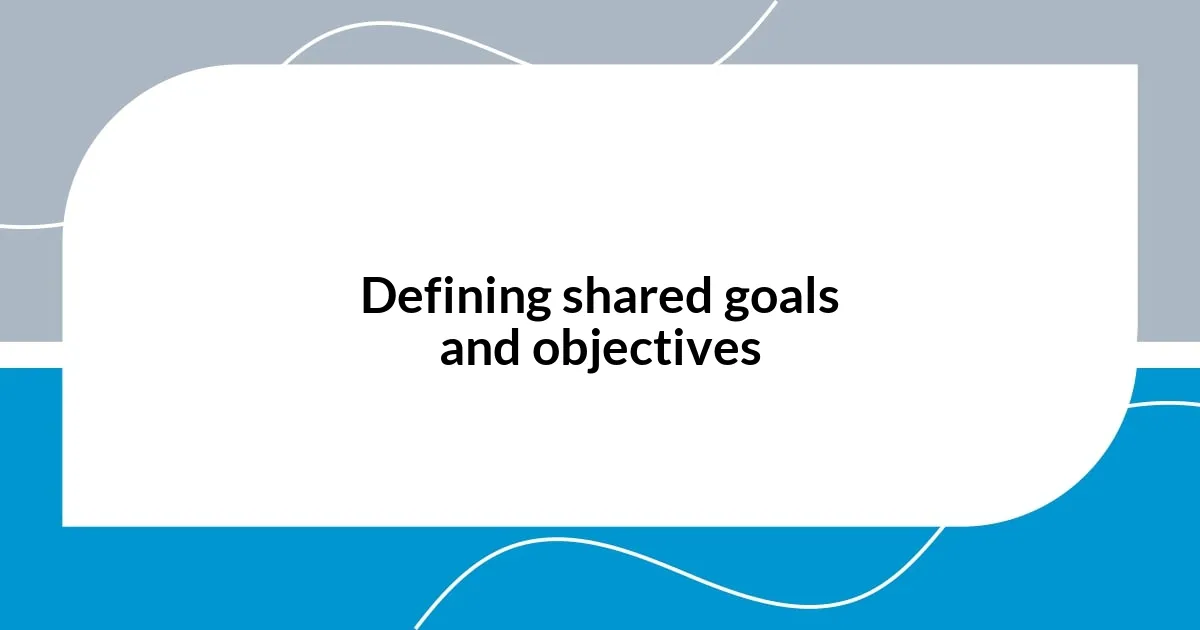
Defining shared goals and objectives
Defining shared goals and objectives is like laying a solid foundation for a building; without it, everything can teeter. I vividly recall a project where my co-author and I spent an entire brainstorming session hammering out our aspirations. We knew we wanted our narrative to inspire budding writers, but we needed to articulate how we’d measure success along the way. Does it resonate with you when you see a shared vision unfold in front of you? It certainly does for me!
In another collaboration, we created a vision board that captured our goals visually. This simple yet effective tactic kept us aligned and motivated. Each time we hit a milestone, we would celebrate, which fueled our enthusiasm. Have you ever felt the energy of progress in a project? It’s contagious! This approach made it easier to stay focused on what truly mattered while allowing our creativity to flourish.
When setting these goals, consideration of each other’s strengths is paramount. I remember when one partner was passionate about research while I thrived in creative writing. By prioritizing our objectives, we shaped our partnership around our individual skills, allowing us to harmonize our efforts seamlessly. Isn’t it empowering when a team comes together, each contributing their unique gifts? It can transform the entire process into something extraordinary.
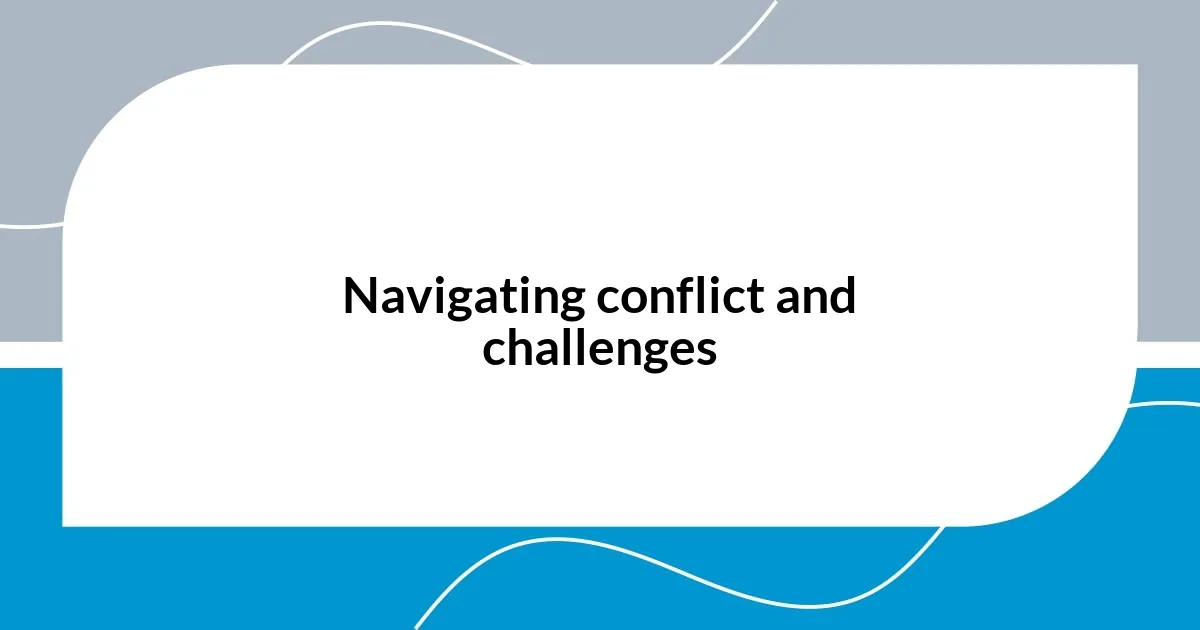
Navigating conflict and challenges
Navigating conflict and challenges is an inevitable part of any collaborative effort. I remember a time when my co-author and I disagreed on a character’s development. At first, it felt daunting, but instead of letting the tension simmer, we held an open discussion where each of us voiced our perspectives. It was enlightening to discover that our differing views actually enriched the story. Have you ever experienced that moment when discomfort morphs into creativity?
Another challenge arose concerning deadlines. I tend to work better under pressure, while my co-author needed more time to refine ideas. To resolve this, we established a flexible timeline that allowed us to balance urgency with quality. It didn’t just ease the stress; it encouraged both of us to trust the other’s process. How often do we overlook the beauty of accommodating each other’s work styles to foster a more productive environment?
Finally, I learned the importance of addressing small frustrations before they grow into significant conflicts. In one collaboration, I noticed my co-author’s feedback had become less frequent, leading me to worry about our dynamic. Instead of letting it linger, I reached out to check in. This honest conversation not only clarified our expectations but deepened our understanding of each other’s challenges. Can you recall a time when a simple conversation turned a potential issue into an opportunity for growth?
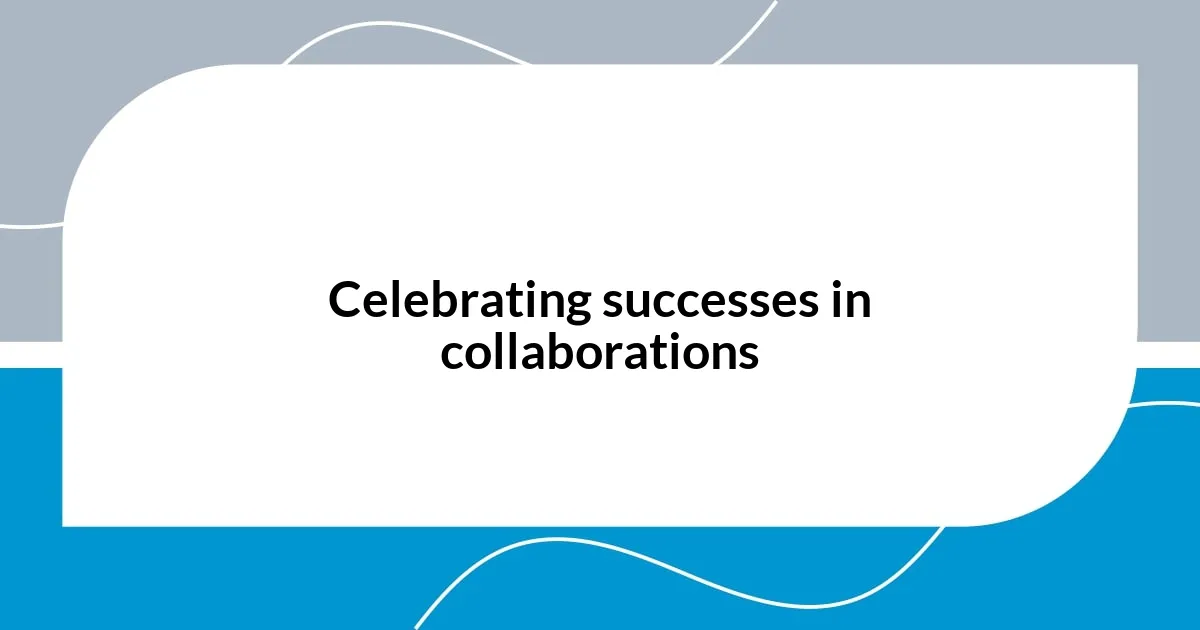
Celebrating successes in collaborations
Celebrating successes in collaborations is one of the most exhilarating parts of the journey. I remember the sheer joy I felt when my co-author and I completed our manuscript ahead of schedule. We decided to celebrate with a small dinner, where we recounted the challenges we faced and how we overcame them together. Doesn’t it feel wonderful to reflect on what you’ve accomplished and acknowledge the teamwork that made it possible?
Another time, we set up a series of mini-celebrations after reaching specific milestones. Each time we finished a chapter, we treated ourselves to a coffee date. Sharing these little triumphs not only recharged our creative energy but reinforced our commitment to the project. How often do we overlook the impact of small acknowledgments on our overall motivation?
I believe that celebrating success fosters a positive atmosphere, paving the way for further collaboration. After finishing a particularly challenging section, we hosted a virtual celebration with a few friends and fellow writers. Sharing our win with others filled us with renewed enthusiasm and support. It’s incredible how pride in our achievements can enhance not just our relationship but also our craft. Have you ever felt that surge of excitement when others acknowledge your hard work?